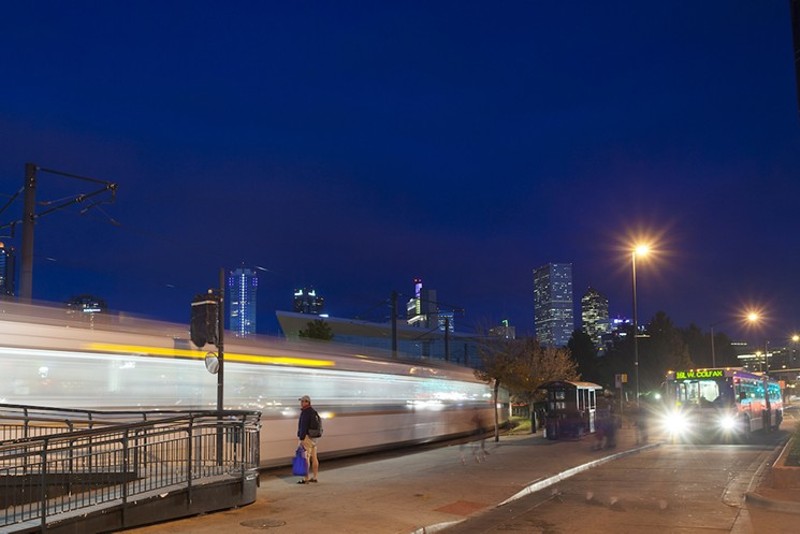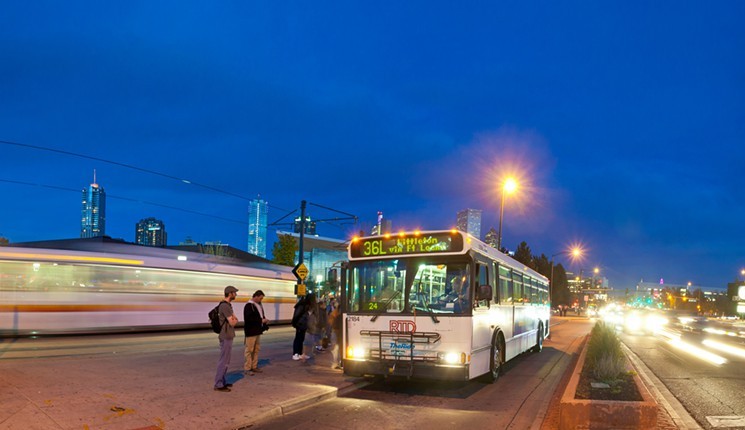Miranda Clark is a regular passenger on RTD’s G Line. But in late June, she saw something she'd never seen before: a rider getting booted and banned from service — a "suspension," as the transit agency puts it.
“Do me a favor and don’t get back on my train," a security officer can be heard saying in a recording of the incident provided by Clark. "This is the person who spit on me last week.”
In the recording, a man denies the accusation before presenting a damaged pass to the security officer. He was promptly kicked off and told not to get back on the train — ever.
RTD employees doled out hundreds of suspensions like these over the past year; data obtained through a Colorado Open Records Act (CORA) request puts the total at 401 between August 2022 and July 2023.
During this period, more than 6,200 citations were issued — most of which were for failing to present a valid fare. For criminal situations, trespassing is the most common citation. There were also nineteen assaults and 51 drug-related citations, most of which were for drug paraphernalia.
Suspensions can range from one day for an initial fare-evasion offense to permanent suspension in the case of criminal activities. For code of conduct violations, the penalty can be as high as a one-year suspension.
Clark tells Westword that seeing the system in action was startling. “I just felt pretty guilty about being a bystander,“ she says, adding that she wondered if she should have said something. “These officers do amazing things generally. I'm just shocked that they can do that.”
In June, the RTD board of directors approved a new code of conduct called Respect the Ride, which is aimed at making public transportation safer through various measures. It clarifies the length of suspensions and allows RTD personnel to consider the bigger picture of a passenger's violations.
Joel Fitzgerald, RTD's chief of police and emergency management, says he's pleased with the new code of conduct because it makes the transit system more welcoming. “That means addressing those bad behaviors and chronic actors that are making it untenable for some to ride,” he explains. “It doesn't happen everywhere, and it doesn't happen on every trip, but when and if we're able to intercede and we're able to make people responsible for their behavior, then that's what we do. Our hope is that it elicits more ridership.”
Respect the Ride is an education-first program — acknowledging that people might be unaware of guidelines around proper behavior or might need a reminder. “Any individual who continues to engage in prohibited behavior or activities may be subject to enforcement ranging from a verbal or written warning, immediate suspension from a vehicle or facility, or a criminal citation," the policy notes.
“Although we issue code of conduct suspensions, most times it’s just not your average rider,” Fitzgerald tells Westword.
On the day of the Denver Nuggets NBA Championship parade — when demand for RTD transportation was heavy — the agency made only one arrest: Fitzgerald himself booked someone for damaging property. Even when people flood public transit, there are only a few bad actors, he contends.
As Clark observed, officers have discretion, and the expectation is that they will use that discretion to be sure chronic offenders are dealt with rather than penalize the average rider, Fitzgerald says. If someone breaks a law or breaches Respect the Ride, they can be removed from RTD property immediately.
“The immediate suspension of a customer that frequents RTD transit services functions as a system that holds customers accountable for their actions and promotes the public health and safety,” reads RTD’s Service Suspension Policy.
Fitzgerald says RTD bans are an even more important tool in light of the agency’s commitment to free rides for passengers under twenty years of age, which starts September 1.
“Part of the value and the learning experience is being out and having to interact with people from all walks of life,” he says. “But we don't expect the environment to be one where people are exposed to rampant drug use, where people are exposed to violent behavior. Those folks that have been doing that are now facing stiffer punishment.”
During the past spring and summer, RTD has actually issued fewer suspensions than it did in previous months going back to last August. The highest number in one month was 52, in September 2022; September is typically a time when traffic increases as students head back to school.
This year, the highest number of suspension in a month was 48, in January. The trend seems to be the inverse of temperatures: When it’s cold, suspensions are higher — perhaps because more people are seeking shelter on buses; in the warmer months, suspensions drop dramatically.
In March, there were 37; in April, just fourteen. May and June had sixteen each. July saw a slight uptick with 24. Fitzgerald suggests that could be because RTD was free in July.
“It may be a little skewed, because right now you're getting inundated with more people that maybe wouldn't traditionally ride that may be problematic,” he hypothesizes.
In August 2022, when RTD’s inaugural Zero Fare for Better Air program made transit free for a month, there were 49 suspensions. From August 1 through August 6 of this year, there were five suspensions. Of the 401 suspensions recorded over the past year, seventeen were for fare violations, 161 for criminal violations, and the rest were code of conduct breaches.
So what were people charged with?
Forty-six passengers ran into drug-related charges, 44 were charged with trespassing, fourteen allegedly urinated or defecated in public, and there were eleven instances of assault. Other offenses included public consumption of alcohol, disorderly conduct, disturbing the peace, defacing property and occasional instances of threats, stalking or harassment.
Given that RTD’s system is so large — and not every bus or train has an officer present— it can be tricky to ensure that people suspended from transit are truly staying away from the system. Fitzgerald says he’s been working to educate operators about who is on the agency's naughty list, as well as encouraging strong communication between operators and RTD police in general.
“Instead of operators being frustrated with the fact that the same people are getting on and creating the same problems, I'd rather them call us,” he says.
Public transportation is a privilege, Fitzgerald adds, and those who abuse that privilege ruin it for everyone else who wants to use RTD’s system. If someone believes they are suspended in error, they are entitled to a hearing. But hearings are only initiated by request, and the department doesn’t have much data about how often they are requested, since it only recently began tracking them.
“RTD just started to track appeals beginning in June of this year,” according to the agency's response to Westword's CORA. “There have only been three to date.”
Asked why it didn’t track appeals before, an RTD spokesperson explained that there wasn't a technological issue that prevented tracking; instead, Fitzgerald asked that the agency start keeping track after he was hired last August.
“If you want to come have your stuff heard out, you can," he says, "and if we're wrong or if it was issued in error, we'll correct it."
[
{
"name": "Air - MediumRectangle - Inline Content - Mobile Display Size",
"component": "12017618",
"insertPoint": "2",
"requiredCountToDisplay": "2",
"watchElement": ".fdn-content-body",
"astAdList": [
{
"adType": "rectangle",
"displayTargets": "mobile"
}
]
},{
"name": "Editor Picks",
"component": "17242653",
"insertPoint": "4",
"requiredCountToDisplay": "1",
"watchElement": ".fdn-content-body",
"astAdList": [
{
"adType": "rectangle",
"displayTargets": "desktop|tablet"
},{
"adType": "rectangle",
"displayTargets": "desktop|tablet|mobile"
}
]
},{
"name": "Inline Links",
"component": "18838239",
"insertPoint": "8th",
"startingPoint": 8,
"requiredCountToDisplay": "7",
"maxInsertions": 25
},{
"name": "Air - MediumRectangle - Combo - Inline Content",
"component": "17261320",
"insertPoint": "8th",
"startingPoint": 8,
"requiredCountToDisplay": "7",
"maxInsertions": 25,
"watchElement": ".fdn-content-body",
"astAdList": [
{
"adType": "rectangle",
"displayTargets": "desktop|tablet"
},{
"adType": "rectangle",
"displayTargets": "desktop|tablet|mobile"
}
]
},{
"name": "Inline Links",
"component": "18838239",
"insertPoint": "8th",
"startingPoint": 12,
"requiredCountToDisplay": "11",
"maxInsertions": 25
},{
"name": "Air - Leaderboard Tower - Combo - Inline Content",
"component": "17261321",
"insertPoint": "8th",
"startingPoint": 12,
"requiredCountToDisplay": "11",
"maxInsertions": 25,
"watchElement": ".fdn-content-body",
"astAdList": [
{
"adType": "leaderboardInlineContent",
"displayTargets": "desktop|tablet"
},{
"adType": "tower",
"displayTargets": "mobile"
}
]
}
]












